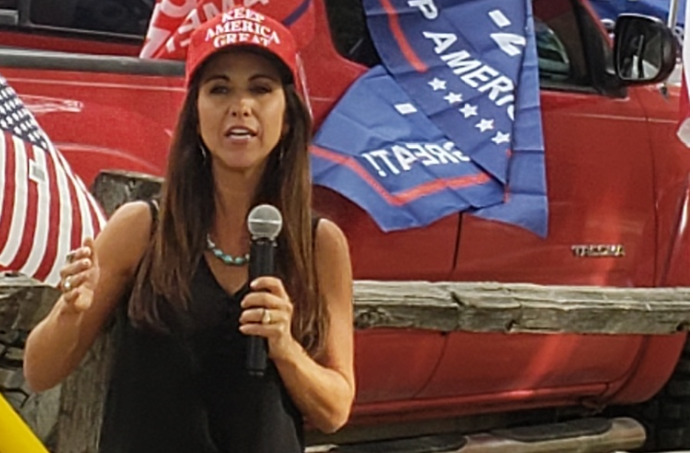Adam Frisch, the Democratic candidate running against Colorado Congresswoman Lauren Boebert, ripped the representative’s vote against aid for Ukraine in a recent radio interview, calling her actions “pro-Putin.”

“When you look at buckets of votes that are about freedom and American democracy, and you keep on voting against veterans and you keep on voting against Ukraine and supporting Putin by default, … that, to me, is where she doesn’t understand the difference between right and wrong a lot,” Frisch said.
Frisch appeared as a guest on the conservative Dan Caplis’ KHOW Show Sept. 30 to defend his stance that Boebert’s actions in Congress are “anti-American.”
Frisch referred to three bills aiming to punish Russia for its aggression toward Ukraine that Boebert voted against. In each case, Boebert was one of a handful of dissenting Republicans.
Boebert was one of 15 Republicans who voted against banning Russian energy imports, one of eight against eliminating Russia’s special trade status, and one of 18 against including Finland and Sweden into NATO.
Boebert was also one of 57 Republicans who voted against a bill to provide $40 billion in aid to Ukraine.
“She’s not only voting against just the Democratic Party, she’s voting against 90% of the Republican Party,” Frisch said. “I just don’t think that her interests line up with what America wants as well as what this district wants.”

Boebert is a first-term Republican who won the seat for Colorado’s 3rd Congressional District, which is located in western and southern parts of the state, in 2020 after upsetting incumbent Scott Tipton in the primary election. She gained mainstream attention for defying public health orders during the pandemic and being fiercely pro-gun.
Boebert’s campaign did not respond to a request for comment.
Frisch added that Boebert had voted against bills to aid veterans multiple times, including the “Restoring Hope for Mental Health and Well-Being Act.”
“This was not a 220-205 vote. She was one of 20,” Frisch said.
When asked if Frisch thought Boebert herself was pro-Putin, Frisch said he was not sure.
Caplis rebutted that Boebert said her votes reflected her disagreement with the add-ons to the bill. He called Boebert’s “no” votes a “badge of honor” and defended the fact many conservatives have aligned themselves with Viktor Orban, the Hungarian autocratic prime minister, not just Boebert. Frisch said that Boebert aligning herself with Orban and Putin was “not a good thing.” Caplis said it was “below the line of basic decency” to imply Boebert supported Putin.
“I think there’s some examples, and I mean that with sincerity,” Frisch said.
Frisch also criticized the congresswoman for using her position to boost her personal political image rather than fight for the needs of the district. Frisch said Boebert’s presence within the district was the biggest issue in the race.
Frisch believed that Boebert has spent more time in places like Mar-a-Lago, Alaska, and New Hampshire to rally for high-profile races than in her own district.
“Influence, to me, is not how many Twitter followers I have,” Frisch said. “Influence, to me, is if you’re respected within your own party. … I do know the handful of freedom caucus numbers are not exactly what the traditional Republicans would like to see.
“I think Lauren Boebert and Marjorie Taylor Greene are part of this ‘anger-tainment” industry,’” Frisch said.
Frisch said his goals are to focus on protecting the state’s and district’s water sources, providing accessible health care for everybody, and improving school funding for rural communities.
“If you’re traveling across the country because you’re fighting for the veterans or the workers or ag or farmer’s, that’s one thing,” Frisch said. “I’m not sure what spending all that time in Mar-a-Lago or at a New Hampshire primary race when she could’ve been at the farmer’s bureau meeting in Pueblo — I’m not sure how that’s helping anyone except herself, and I’m not sure that’s helping herself in the long run.”
Caplis argued Boebert’s influence is good for the district, as it puts her in a better position to impact issues her supporters care about.
Frisch disagreed, using the water crisis as an example.
“If she was traveling in Wyoming and New Mexico and Montana and in the western part of the region trying to figure out this water crisis we’re having, I would understand that,” Frisch said. “I would ask, what she is doing in Alaska cheering on Sara Palin, how does that help a single voter in her district, whether they voted for her before. When she’s down running around in Mar-a-Lago, I’m not sure that’s helping anyone in her district besides herself.”
Frisch edged out fellow Democrat Sol Sandoval by fewer than 300 votes in the June primary election, earning the nod as the Democratic nominee for Colorado’s 3rd District. Frisch pins himself as a moderate, pro-business candidate who only recently became a registered Democrat. The Aspen businessman has built his campaign around promoting locally produced oil and gas, rebuilding the middle class, and protecting local water resources and forest health, according to his campaign website.




